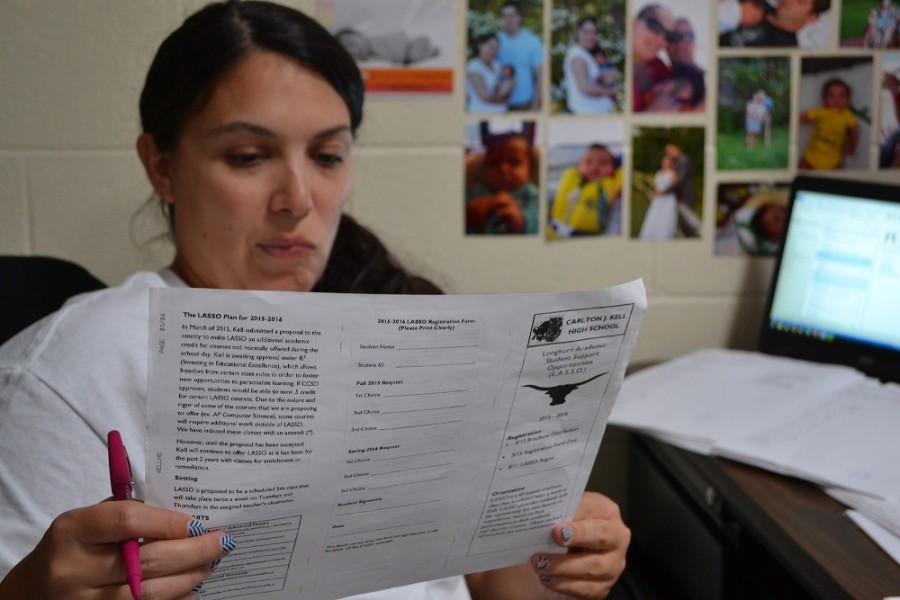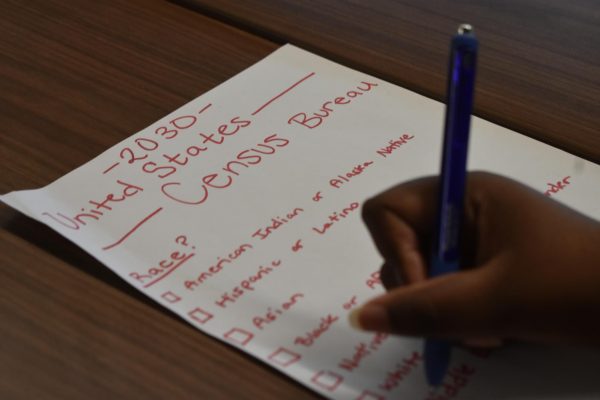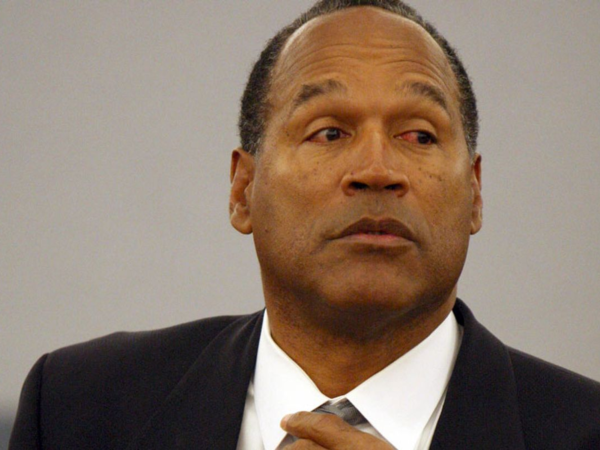New “Spearhead” program aims to enrich academia
Math teacher Mrs. Morris looking over the new program of short class and seminars to enlighten students in topics not usually taught.
August 31, 2015
Along with all of the other changes put into place for the 2015-2016 NC school year, next semester will debut the largest yet: the new “Spearhead” program.
The program, which exists at other high schools in the county, will allow teachers to plan short classes and seminars on topics they do not usually teach, or to provide extra time for tutoring.
According to principal Bucky Horton, the new program aims to enlighten and expand: “We hope to give our students the opportunity to expand on areas that either they need some growth in or to expand horizons. There will be some enrichment activities or courses that teachers will offer and students can participate in, and there will be remediation time. Hopefully it will branch off into different areas so that we can encompass all of our students’ desires and needs.”
Head Administrator and adviser for “Spearhead,” Steve Revard, explained the program further: “The scheduling will work very similarly to the way that it does with normal classes. We have teachers on campus that like to teach one thing versus another and students who want to take one thing versus another. In this program, teachers will have the ability to say what it is they’d like to do. Students will have the ability to say what it is they’d like to learn, and we would kind of build off of what people’s preferences are and try to accommodate those to the best of our ability.”
The program already sparked imaginative ideas from NC teachers. AP English Language and American Literature teacher Lindsay Kovel will center her seminars around the Harry Potter series and examining and analyzing language and other nuances in the text. Other examples include specific Career Technology seminars from “Video Broadcasting Basics” to “Learning HTML.”
“Our CTAE programs are phenomenal here, so this is an opportunity for kids who don’t have time to take a full CTAE class to take a session on related disciplines, and hopefully that will spark interest and enrich their education,” Horton reflected.
If teachers decide not to teach a separate class, they can set up time for remediation in their subject areas.
Revard commented on the chance to help students individually: “Specifically with those kids on remediation, one of the things that we noticed at other schools is that there were students who were there getting almost individualized attention. You see, on a typical schedule you would have 35 kids in a classroom but you’d also have a full department that was on planning period at some point during the day. So now, if every teacher participates in this at once, you whittle down the amount of students in a classroom, and you have more teachers because nobody is on planning. Then you can give almost individualized instruction to kids that need remediation.”
The new program will differ from a regular class in that students retain flexibility to change what they participate in.
“If we can get this to work the way we want it to, then the schedule for this will be living, in that it will be changeable,” Horton explained. “So if at one point you are having a hard time in say freshman Biology, you can go work with a Biology teacher for tutoring. Then, eventually, if you get your grades up and start to not require tutoring anymore, you can start working on something else, like weightlifting. So the idea is you’re not going to be put into one spot where you’ll stay all year even if you don’t need it.”
Because of its multifaceted nature, teachers and administration will continue to work out kinks in the program. The frequency of the classes and their length have not yet been decided, and the name still stands as a placeholder.
According to Revard, the name of the program became a compromise he made when taking on the project: “We have to come up with a name that speaks more to what it is. So I am going to take it to our student leadership. The teachers drive the program, the students participate and pick the name, and when you add all of that together with student and teacher support and how can it not work?”
Owing to its size, the program needs more development before putting it into motion next semester.
“I can tell you that this is by far the biggest project that we’ve had take place at NC that I’ve ever been a part of,” Revard reflected. “This is a massive move, because any time you’re talking about taking away from instructional time to do something else and moving 3000 kids and 190 teachers in one direction at the same time during the school day, it’s a massive undertaking. This is the biggest project we’ve ever tried to implement schoolwide all at once.”
Overall, both Horton and Revard are excited to implement the new program so that NC can grow as an educational facility.
“If we didn’t try to think of creative ways administratively and as teachers to give our students new opportunities to understand and get into the modern day workplace and college setting then we’d be doing them a tremendous disservice,” Revard reflected. “We would be crazy not to try and reinvent and think of different ways that we can enhance everyday experiences here in a non-traditional fashion. So we’re not afraid to take on a project this big and realizing that there are going to be issues that come about if we know that the end result is enhancing the experience here for our students.”


















